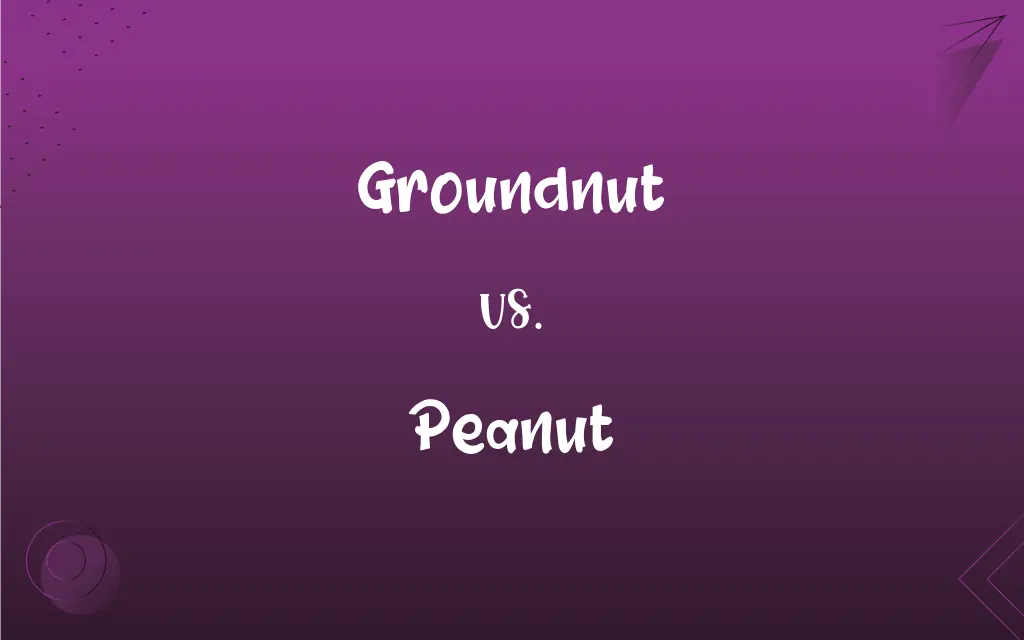Groundnut vs. Peanut: What's the Difference?
Edited by Aimie Carlson || By Janet White || Updated on October 6, 2023
"Groundnut" and "Peanut" generally refer to the same legume primarily used for its edible seeds; however, "Groundnut" is more commonly used in British English, while "Peanut" is the preferred term in American English.

Key Differences
"Groundnut" is a term commonly employed in the United Kingdom and other Commonwealth countries to describe the edible seed of the legume Arachis hypogaea. In contrast, "Peanut" is the term predominantly used in the United States and Canada for the same edible seed.
In both cases, "Groundnut" and "Peanut" are cultivated for their seeds, which are high in protein and used in a variety of food products. Both terms refer to the same plant and are often used interchangeably in global trade and culinary discussions.
However, "Groundnut" can also refer to other plants that produce underground tubers, which adds a layer of ambiguity to the term. On the other hand, "Peanut" is specifically tailored to Arachis hypogaea and is less likely to cause confusion.
From a culinary perspective, both "Groundnuts" and "Peanuts" serve similar purposes. They are used to make oils, butters, and are often consumed as snacks or included in dishes. From a botanical standpoint, both terms refer to a legume rather than a true nut.
Comparison Chart
Common Usage
British English
American English
ADVERTISEMENT
Botanical Family
Legume
Legume
Culinary Applications
Oils, butters, snacks
Oils, butters, snacks
Ambiguity
Can refer to other plants
Specifically Arachis hypogaea
Global Trade
Often used
More commonly used
Groundnut and Peanut Definitions
Groundnut
A legume cultivated for its edible seeds.
The groundnut is a major export for several countries.
ADVERTISEMENT
Peanut
The American English term for Arachis hypogaea.
Peanuts are often salted and roasted.
Groundnut
The British English term for Arachis hypogaea.
Groundnuts are often used in African cuisines.
Peanut
A seed used for its oil and butter.
Peanut butter and jelly sandwiches are popular in America.
Groundnut
A term that may refer to other tuber-producing plants.
The term groundnut can sometimes lead to confusion.
Peanut
A legume, not a true nut.
Despite its name, the peanut is actually a legume.
Groundnut
A high-protein food source.
Groundnuts are rich in proteins and nutrients.
Peanut
A source of plant-based protein.
Peanuts are an excellent plant-based protein option.
Groundnut
A climbing vine (Apios americana) in the pea family, native to eastern North America, having compound leaves, clusters of fragrant brownish flowers, and small edible tubers.
Peanut
A prostrate southern Brazilian plant (Arachis hypogaea) widely cultivated in tropical and warm temperate regions, having yellow flowers on stalks that bend over so that the seed pods ripen underground.
Groundnut
Any of several plants having underground tubers or nutlike parts.
Peanut
The edible, nutlike, oily seed of this plant, used for food and as a source of oil. Also called regionally goober, goober pea.
Groundnut
The tuber or nutlike part of such a plant.
Peanut
A peanut-shaped piece of polystyrene, used in cushioning items during shipment.
Groundnut
Chiefly British and South Atlantic US A peanut.
Peanut
A small child. Often used as a term of affection.
Groundnut
A climbing vine, Apios americana, of eastern North America, having fragrant brownish flowers and small edible tubers.
Peanut
A person who is regarded as insignificant.
Groundnut
Any similar plant having underground tubers.
Peanut
Peanuts(Informal) A very small amount of money; a trifling sum.
Groundnut
The nutlike tuber of such a plant, especially peanuts.
Peanut
A legume resembling a nut, the fruit of the plant Arachis hypogaea.
Groundnut
A plant which bears its nutlike seeds underground, such as a peanut (Arachis hypogaea) or a Bambara groundnut (Vigna subterranea).
Peanut
(US) A very small clam.
Groundnut
The fruit of the Arachis hypogæa (native country uncertain); the peanut; the earthnut.
Peanut
See very small amount.
Groundnut
A North American vine with fragrant blossoms and edible tubers; important food crop of Native Americans
Peanut
(transitive) To pull on somebody's tie as a prank, causing the knot to tighten.
Groundnut
Nutlike tuber; important food of Native Americans
Peanut
The fruit of a trailing leguminous plant (Arachis hypogæa); also, the plant itself, which is widely cultivated for its fruit.
Groundnut
Pod of the peanut vine containing usually 2 nuts or seeds; `groundnut' and `monkey nut' are British terms
Peanut
Underground pod of the peanut vine
Groundnut
A seed used in making oils and butters.
Groundnut oil is commonly used for frying.
Peanut
Widely cultivated American plant cultivated in tropical and warm regions; showy yellow flowers on stalks that bend over to the soil so that seed pods ripen underground
Peanut
A young child who is small for his age
Peanut
Pod of the peanut vine containing usually 2 nuts or seeds; `groundnut' and `monkey nut' are British terms
Peanut
Of little importance or influence or power; of minor status;
A minor, insignificant bureaucrat
Peanut politicians
Peanut
A common ingredient in snacks and meals.
Peanuts are often used in Asian stir-fry dishes.
FAQs
Q: Why is it called a Groundnut?
A: It's called a Groundnut because the plant's pods develop underground.
Q: What is a Peanut?
A: A Peanut is the American term for the edible seed of the legume Arachis hypogaea.
Q: Is Groundnut oil the same as Peanut oil?
A: Yes, both oils are derived from the seeds of the same plant.
Q: What is a Groundnut?
A: A Groundnut is a legume primarily known for its edible seeds.
Q: Is Groundnut high in protein?
A: Yes, Groundnuts are a good source of plant-based protein.
Q: Are Groundnuts and Peanuts safe for pets?
A: Small amounts may be safe, but it's best to consult a vet due to potential allergens.
Q: Are Groundnut and Peanut the same?
A: Yes, they generally refer to the same legume but are used in different regions.
Q: Are Peanuts true nuts?
A: No, despite the name, peanuts are legumes, not true nuts.
Q: Can Groundnuts be allergic?
A: Yes, like peanuts, groundnuts can cause allergic reactions in some people.
Q: Where are Groundnuts commonly grown?
A: Groundnuts are grown in tropical and subtropical regions worldwide.
Q: What foods commonly contain Peanuts?
A: Peanuts are found in snacks, butters, oils, and various dishes.
Q: Can Groundnuts be eaten raw?
A: They can be, but they are usually roasted, boiled, or used in dishes.
Q: What’s the nutritional value of Peanuts?
A: Peanuts are rich in protein, healthy fats, fiber, and various vitamins and minerals.
Q: Why is Peanut butter popular in America?
A: Peanut butter is popular for its taste, versatility, and nutritional content.
Q: What's the main use of Peanut oil?
A: Peanut oil is commonly used for frying due to its high smoke point.
About Author
Written by
Janet WhiteJanet White has been an esteemed writer and blogger for Difference Wiki. Holding a Master's degree in Science and Medical Journalism from the prestigious Boston University, she has consistently demonstrated her expertise and passion for her field. When she's not immersed in her work, Janet relishes her time exercising, delving into a good book, and cherishing moments with friends and family.
Edited by
Aimie CarlsonAimie Carlson, holding a master's degree in English literature, is a fervent English language enthusiast. She lends her writing talents to Difference Wiki, a prominent website that specializes in comparisons, offering readers insightful analyses that both captivate and inform.































































